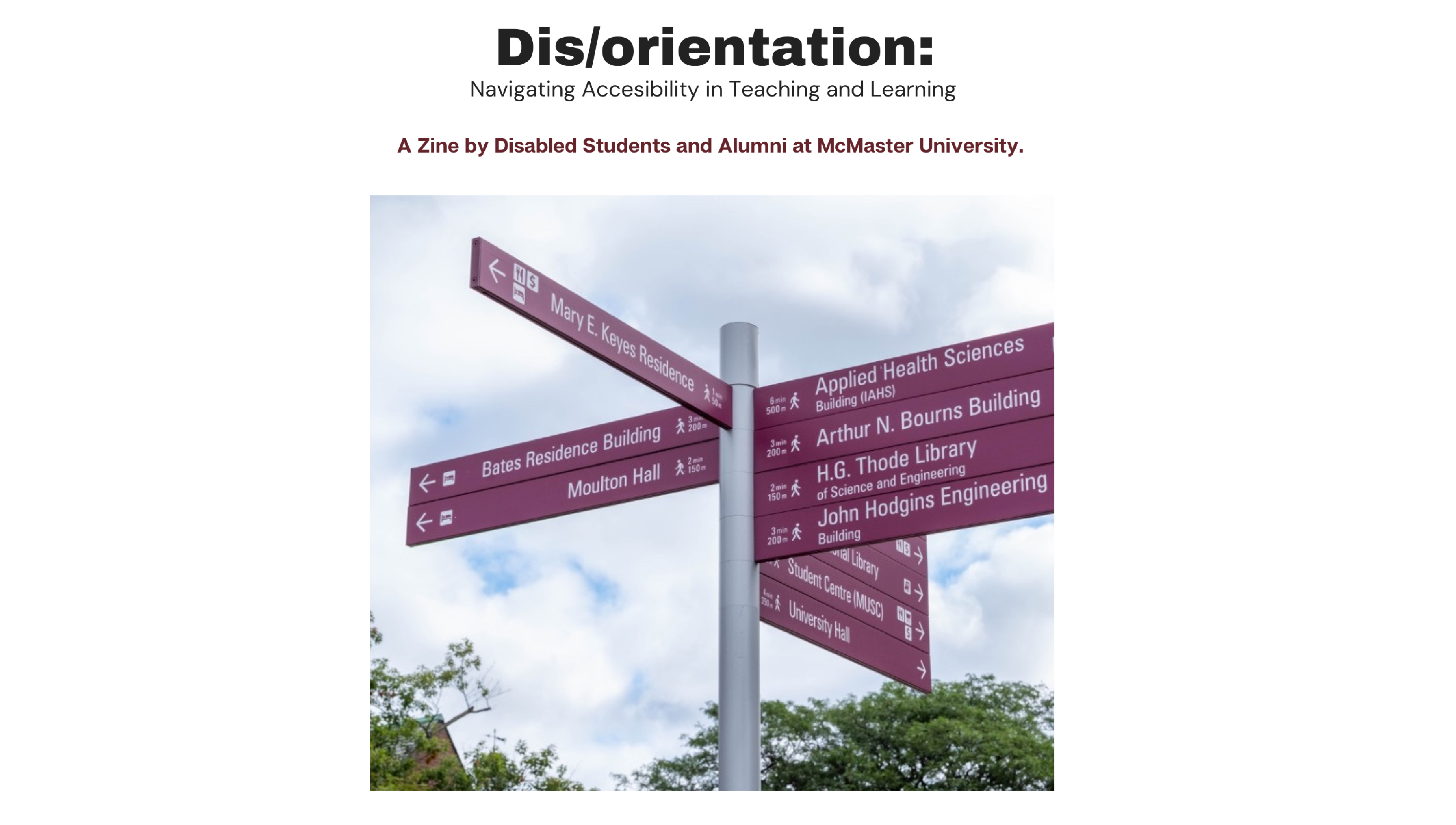Call for Zine Submissions: Dis/orientation: Navigating accessibility in teaching and learning

Current and former McMaster students with lived experiences of disability, disablement, inaccessibility, and/or ableism are invited to contribute to Dis/orientation: Navigating accessibility in teaching and learning, a zine by disabled students and alumni at McMaster University.
We also invite staff, faculty, and non-disabled students to share written and creative responses to the zine for publication in a new “Responses from Allies” section.
We understand ‘disability’ as a broad umbrella term for diverse experiences of difference, including people who may identify as living with a physical, learning, sensory, developmental, and/or mental health disability or chronic pain, as well as people who identify as disabled, chronically ill, sick, immunocompromised, D/deaf, hard of hearing, Mad, in recovery, and/or neurodivergent.
Submission deadline: July 31, 2022
Zine submissions should engage with one or more of the following prompts:
- What has it been like to learn at McMaster University while negotiating disability/ (in)accessibility?
- What specific experiences stand out to you?
- How have you been impacted by the barriers you have faced?
- What have you done to negotiate these barriers either individually and/or with others?
- What has respectful support looked and felt like, or what might this look and feel like?
- How have experiences with formal or informal groups of disabled students been meaningful to you?
- What has disabled student organizing or advocacy looked like and meant for you?
- What do you want the future of accessible and disability-inclusive teaching and learning to look like? What needs to change?
- What recommendations do you have for faculty, teaching assistants, and other educational staff?
- What are your responses to the published zine contributions from disabled students? What resonates with, provokes, challenges, disorients, encourages you? How and in what ways? How do (or might) you attend to students’ experiences in your practice and work on campus?
Format/Genre
The zine welcomes individual and group submissions in textual (words) and/or visual formats that can be printed. Formats may include, but are not limited to:
- Creative arts (e.g., collage, comics, graphic design, drawing, painting, photography).
- Literary arts (e.g., dialogues/interviews, essays, poetry, lyrics, reflections, satire, short fiction, theatre scripts).
- Other (e.g., lists, recipes, games, puzzles…)
There is a maximum of 1500 words (for literary pieces) or up to 3 letter-sized pages (for visual pieces) per submission, though we especially welcome shorter pieces! Our goal is to include submissions from a wide variety of individuals/groups and to accept as many as we can.
Authors of accepted pieces will be asked to provide material for accessibility purposes at a later time and/or consulted in the preparation of these components (e.g., alternative text for images).
Timelines, Submission Instructions, and Honoraria
Timelines
- July 31, 2022: Zine submissions due
- August 15, 2022: Correspondence with contributors regarding the status of their piece
- Fall 2022: Publication of new zine pieces
Submission Instructions
We will accept submissions via our Author Bio Information and Submission Form.
NOTE: submission via this form requires a Google account. If you encounter any difficulties or have any questions, please contact us at MacDisZn@mcmaster.ca.
- Please submit visual pieces as .jpeg, .png, or other common, non-proprietary, image file format.
- We cannot accept physical art pieces. Please provide either pictures or a scan of the work in one of the formats described above.
- We will also accept submissions (e.g., YouTube videos) via QR code.
- Please submit text-based pieces as a .docx or .rtf file.
In addition to uploading your submission, you’ll be asked to:
- Provide a brief bio of up to 100 words (written in the third person) including the name under which you would like to be published (e.g., all or part of your name, a penname, a group name, or ‘anonymous’).
- Complete a brief author form (e.g., indicating your program and years of study at McMaster and graduation year if applicable, email address for contact purposes, etc.)
Honoraria
Student contributors whose pieces are chosen for publication will be eligible to request an honorarium (amount dependent on budget and overall number of accepted submissions), provided by a grant from the Arts Research Board, McMaster University.
Potential Examples
We are looking for submissions that cover a variety of topics. Some examples of different forms and content could include, but are NOT limited to, the following:
- A series of 6 photos representing your learning experiences as a disabled student, with brief accompanying stories/captions
- Photos of a sculpture representing your experience of disabled student community
- A brief article on a disability-related student initiative at McMaster (e.g., a description of how an individual student or group of students came together and what you sought to accomplish)
- A comic strip / graphic telling of a disability-related initiative you participated in at McMaster
- Photo edits pointing out inaccessibility in learning environments at McMaster
- A poem on things you wish your instructors knew about the importance of accessible education
- A short fictional story about what you hope accessibility will look like in teaching and learning at McMaster in the year 2050
- A drawing of your dream future for neurodivergent students at McMaster
Please note that the examples provided here are intended to offer a starting point for submission concepts. Submissions do not need to adhere to these themes or specific mediums.
Collaborators and Contact Information
Contact the Zine Team at MacDisZn@mcmaster.ca with any questions, to request a Word/PDF version of this Call for Submissions, or to chat through any initial ideas and whether they would fit within the scope of the zine.
Sponsors
We are grateful for financial support provided by McMaster University:
- MacPherson Institute’s Student Partners Program
- Student Success Centre’s Career Access Professional Services Program (CAPS)
- Arts Research Board.

